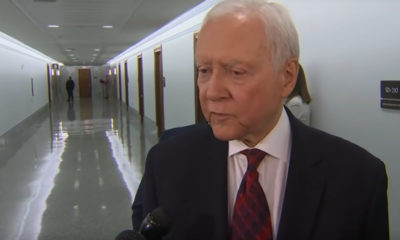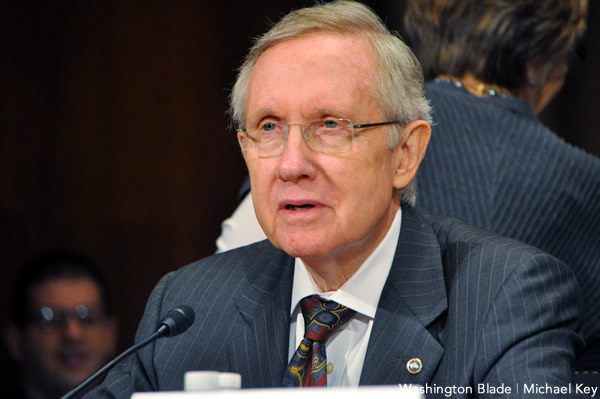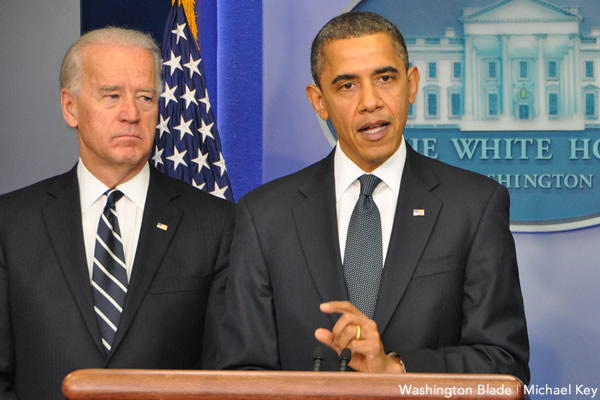National
ENDA blame game underway
Dems cite GOP opposition; others fault Senate leadership

LGBT activists targeted Sen. Majority Leader Harry Reid (D-Nev.) last week, urging him to advance ENDA. (Washington Blade photo by Michael Key)
Democratic senators are blaming Republican obstructionism for the Senate’s failure to advance the Employment Non-Discrimination Act, but others say a lack of strategy is preventing a vote.
The plight of ENDA in the Senate received renewed attention last week when GetEqual staged a protest in Las Vegas blocking traffic on Las Vegas Boulevard and demanding Senate Majority Leader Harry Reid (D-Nev.) take action.
The legislation, stalled in the House and Senate, would prohibit job bias against LGBT people in most public and private workforce scenarios.
Democratic supporters say Republican opposition is preventing Senate action on the bill.
Assistant Majority Leader Richard Durbin (D-Ill.) said Democratic leadership wants to move forward with ENDA, but noted difficulties in moving any item on the legislative agenda forward.
“We have a tough time moving anything on the calendar because of Republican filibusters,” Durbin said.
Still, Durbin said a vote on the legislation in September after lawmakers return from August recess is “possible,” while adding that timeframe is a “pretty hectic period.” He noted that a vote would more likely come in the period following the November election.
Sen. Tom Harkin (D-Iowa), chair of the Senate Health, Education, Labor & Pensions Committee where ENDA is pending, on Tuesday expressed similar grievances about Republican obstructionism.
Asked what’s keeping the legislation from coming to a Senate vote, Harkin simply replied, “Republicans.”
“It’s one of my priority items,” Harkin said. “I’d like to move it, but [I’m] not certain we’re going to have the time.”
Harkin said he couldn’t immediately recall if any particular part of the measure was causing controversy and keeping it from coming to a Senate vote.
“There’s been a lot of objections by certain Republicans on it,” Harkin said. “As far as I’m concerned, they’re not legitimate. I couldn’t even enumerate them right now, I forget what they are.”
Mara Keisling, executive director of the National Center for Transgender Equality, also blamed Republicans for the failure to advance ENDA in the Senate. She also cited what she called a “general dysfunction” in the chamber as a problem.
“It’s certainly not all about ENDA,” she said. “It’s certainly, certainly not about transgender inclusion in ENDA. They can’t get campaign finance reform through, they can’t get, sometimes, job bills through.”
On Tuesday, Democratic leadership tried to move forward on a campaign finance reform bill known as the DISCLOSE Act. Republicans, who hold 41 of 100 seats in the chamber, were unified in their opposition and able to filibuster a motion to proceed with the legislation.
Still, ENDA is likely to fare better with Republicans in the Senate because the legislation has two GOP co-sponsors, Sens. Susan Collins and Olympia Snowe of Maine.
R. Clarke Cooper, executive director of the Log Cabin Republicans, dismissed the notion that Republicans were holding up ENDA in the Senate and said “only the current Senate majority leadership can truly answer” why ENDA isn’t on the calendar.
“Blaming the minority leadership for the majority’s disorganization and lack of planning this year is simplistic and, frankly, lazy,” Cooper said. “Both sides of the aisle are frustrated with the lack of activity.”
Sen. Jeff Merkley (D-Ore.), the sponsor for ENDA in the Senate, is hoping House passage of ENDA would jumpstart interest in passing it in the Senate, according to his office.
“I think, at this point, it’s kind of something that we’re waiting for the House to pass to build a little momentum here in the Senate, and then hopefully get going on it here,” said Mike Westling, a Merkley spokesperson.
But in response to inquiries on why the House hasn’t moved forward with the bill, House leadership pointed to the lack of a strategy for ENDA in the Senate.
“We should encourage the Senate to develop a course for ENDA to ensure that when the House passes the legislation, the Senate can move quickly to send the legislation to the president’s desk,” Drew Hammill, a spokesperson for U.S. House Speaker Nancy Pelosi, earlier told the Blade.
Asked whether any discussions on a strategy to advance ENDA in the Senate have taken place, Durbin replied, “We have not reached that level.”
Harkin said he hadn’t yet done a whip count on the legislation and wasn’t sure whether the legislation would have 60 votes to pass.
“I just know that initial inquiries about getting a time limit on it were unfruitful,” he said. “So, without a time limit, we’re not going to bring anything up.”
Harkin said Senate leadership is “always looking” for other bills that could serve as a vehicle to move ENDA forward as an amendment, but didn’t name any potential legislation.
State Department
State Department releases annual human rights report
Antony Blinken reiterates criticism of Uganda’s Anti-Homosexuality Act

Secretary of State Antony Blinken on Monday once again reiterated his criticism of Uganda’s Anti-Homosexuality Act upon release of the State Department’s annual human rights report.
“This year’s report also captures human rights abuses against members of vulnerable communities,” he told reporters. “In Afghanistan, the Taliban have limited work opportunities for women, shuttered institutions found educating girls, and increasing floggings for women and men accused of, quote, ‘immoral behavior,’ end quote. Uganda passed a draconian and discriminatory Anti-Homosexuality Act, threatening LGBTQI+ individuals with life imprisonment, even death, simply for being with the person they loved.”
Ugandan President Yoweri Museveni last May signed the law, which contains a death penalty provision for “aggravated homosexuality.”
The U.S. subsequently imposed visa restrictions on Ugandan officials and removed the country from a program that allows sub-Saharan African countries to trade duty-free with the U.S. The World Bank Group also announced the suspension of new loans to Uganda.
Uganda’s Constitutional Court earlier this month refused to “nullify the Anti-Homosexuality Act in its totality.” More than a dozen Ugandan LGBTQ activists have appealed the ruling.
Clare Byarugaba of Chapter Four Uganda, a Ugandan LGBTQ rights group, on Monday met with National Security Council Chief-of-Staff Curtis Ried. Jay Gilliam, the senior LGBTQI+ coordinator for the U.S. Agency for International Development, in February traveled to Uganda and met with LGBTQ activists who discussed the Anti-Homosexuality Act’s impact.
“LGBTQI+ activists reported police arrested numerous individuals on the basis of their sexual orientation or gender identity and subjected many to forced anal exams, a medically discredited practice with no evidentiary value that was considered a form of cruel, inhuman, and degrading treatment and could amount to torture,” reads the human rights report.
The report, among other things, also notes Ugandan human rights activists “reported numerous instances of state and non-state actor violence and harassment against LGBTQI+ persons and noted authorities did not adequately investigate the cases.”
Report highlights anti-LGBTQ crackdowns in Ghana, Hungary, Russia
Ghanaian lawmakers on Feb. 28 approved the Promotion of Proper Human Sexual Rights and Ghanaian Family Values Bill. The country’s president, Nana Akufo-Addo, has said he will not sign the measure until the Ghanaian Supreme Court rules on whether it is constitutional or not.
The human rights report notes “laws criminalizing consensual same-sex sexual conduct between adults” and “crimes involving violence or threats of violence targeting lesbian, gay, bisexual, transgender, queer or intersex persons” are among the “significant human rights issues” in Ghana.
The report documents Hungarian Prime Minister Viktor Orbán and members of his right-wing Fidesz party’s continued rhetoric against “gender ideology.” It also notes Russia’s ongoing crackdown against LGBTQ people that includes reports of “state actors committed violence against LGBTQI+ individuals based on their sexual orientation or gender identity, particularly in Chechnya.”
The report specifically notes Russian President Vladimir Putin on July 24 signed a law that bans “legal gender recognition, medical interventions aimed at changing the sex of a person, and gender-affirming care.” It also points out Papua New Guinea is among the countries in which consensual same-sex sexual relations remain criminalized.

The Cook Islands and Mauritius in decriminalized homosexuality in 2023.
The report notes the Namibia Supreme Court last May ruled the country must recognize same-sex marriages legally performed outside the country. The report also highlights the Indian Supreme Court’s ruling against marriage equality that it issued last October. (It later announced it would consider an appeal of the decision.)
Congress requires the State Department to release a human rights report each year.
The Biden-Harris administration in 2021 released a memorandum that committed the U.S. to promoting LGBTQ+ and intersex rights abroad.
The full report can be read here.
National
Same-sex couples vulnerable to adverse effects of climate change
Williams Institute report based on Census, federal agencies

A new report by the Williams Institute at the UCLA School of Law finds that same-sex couples are at greater risk of experiencing the adverse effects of climate change compared to different-sex couples.
LGBTQ people in same-sex couple households disproportionately live in coastal areas and cities and areas with poorer infrastructure and less access to resources, making them more vulnerable to climate hazards.
Using U.S. Census data and climate risk assessment data from NASA and the Federal Emergency Management Agency, researchers conducted a geographic analysis to assess the climate risk impacting same-sex couples. NASA’s risk assessment focuses on changes to meteorological patterns, infrastructure and built environment, and the presence of at-risk populations. FEMA’s assessment focuses on changes in the occurrence of severe weather events, accounting for at-risk populations, the availability of services, and access to resources.
Results show counties with a higher proportion of same-sex couples are, on average, at increased risk from environmental, infrastructure, and social vulnerabilities due to climate change.
“Given the disparate impact of climate change on LGBTQ populations, climate change policies, including disaster preparedness, response, and recovery plans, must address the specific needs and vulnerabilities facing LGBTQ people,” said study co-author Ari Shaw, senior fellow and director of international programs at the Williams Institute. “Policies should focus on mitigating discriminatory housing and urban development practices, making shelters safe spaces for LGBT people, and ensuring that relief aid reaches displaced LGBTQ individuals and families.”
“Factors underlying the geographic vulnerability are crucial to understanding why same-sex couples are threatened by climate change and whether the findings in our study apply to the broader LGBTQ population,” said study co-author Lindsay Mahowald, research data analyst at the Williams Institute. “More research is needed to examine how disparities in housing, employment, and health care among LGBT people compound the geographic vulnerabilities to climate change.”
Read the report
Federal Government
Lambda Legal praises Biden-Harris administration’s finalized Title IX regulations
New rules to take effect Aug. 1

The Biden-Harris administration’s revised Title IX policy “protects LGBTQ+ students from discrimination and other abuse,” Lambda Legal said in a statement praising the U.S. Department of Education’s issuance of the final rule on Friday.
Slated to take effect on Aug. 1, the new regulations constitute an expansion of the 1972 Title IX civil rights law, which prohibits sex-based discrimination in education programs that receive federal funding.
Pursuant to the U.S. Supreme Court’s ruling in the landmark 2020 Bostock v. Clayton County case, the department’s revised policy clarifies that discrimination on the basis of sexual orientation and gender identity constitutes sex-based discrimination as defined under the law.
“These regulations make it crystal clear that everyone can access schools that are safe, welcoming and that respect their rights,” Education Secretary Miguel Cardona said during a call with reporters on Thursday.
While the new rule does not provide guidance on whether schools must allow transgender students to play on sports teams corresponding with their gender identity to comply with Title IX, the question is addressed in a separate rule proposed by the agency in April.
The administration’s new policy also reverses some Trump-era Title IX rules governing how schools must respond to reports of sexual harassment and sexual assault, which were widely seen as imbalanced in favor of the accused.
Jennifer Klein, the director of the White House Gender Policy Council, said during Thursday’s call that the department sought to strike a balance with respect to these issues, “reaffirming our longstanding commitment to fundamental fairness.”
“We applaud the Biden administration’s action to rescind the legally unsound, cruel, and dangerous sexual harassment and assault rule of the previous administration,” Lambda Legal Nonbinary and Transgender Rights Project Director Sasha Buchert said in the group’s statement on Friday.
“Today’s rule instead appropriately underscores that Title IX’s civil rights protections clearly cover LGBTQ+ students, as well as survivors and pregnant and parenting students across race and gender identity,” she said. “Schools must be places where students can learn and thrive free of harassment, discrimination, and other abuse.”
-

 South America4 days ago
South America4 days agoDaniel Zamudio murderer’s parole request denied
-

 Maryland4 days ago
Maryland4 days agoMontgomery County police chief discusses arrest of trans student charged with planned school shooting
-

 Commentary5 days ago
Commentary5 days agoWorld ‘isn’t much different today’
-

 Theater4 days ago
Theater4 days ago‘Amm(i)gone’ explores family, queerness, and faith









